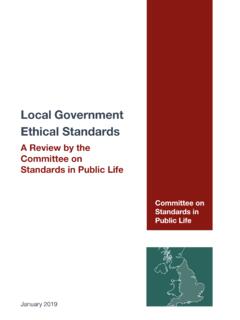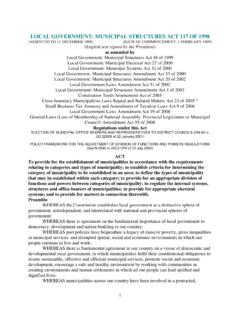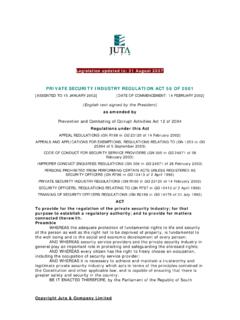Transcription of A plain English guide to the Localism Bill - Update - GOV.UK
1 A plain English guide to the Localism Act A plain English guide to the Localism Act November 2011 Department for Communities and Local Government Department for Communities and Local Government Eland House Bressenden Place London SW1E 5DU Telephone: 030 3444 0000 Website: Crown Copyright, 2011 Copyright in the typographical arrangement rests with the Crown. This publication, excluding logos, may be reproduced free of charge in any format or medium for research, private study or for internal circulation within an organisation.
2 This is subject to it being reproduced accurately and not used in a misleading context. The material must be acknowledged as Crown copyright and the title of the publication specified. You may re-use this information (not including logos) free of charge in any format or medium, under the terms of the Open Government Licence. To view this licence, visit licence/ or write to the Information Policy Team, The National Archives, Kew, London TW9 4DU, or e-mail: If you require this publication in an alternative format please email DCLG Publications Tel: 030 0123 1124 Fax: 030 0123 1125 Email: Online via the website: November 2011 ISBN: 978 1 4098 3225-6 Foreword The time has come to disperse power more widely in Britain today.
3 The Prime Minister and the Deputy Prime Minister, Coalition Agreement, May 2010 For too long, central government has hoarded and concentrated power. Trying to improve people s lives by imposing decisions, setting targets and demanding inspections from Whitehall simply doesn t work. It creates bureaucracy. It leaves no room for adaptation to reflect local circumstances or innovation to deliver services more effectively and at lower cost. And it leaves people feeling done to and imposed upon - the very opposite of the sense of participation and involvement on which a healthy democracy thrives.
4 I have long believed there is a better way of doing things. Eight years ago I wrote a book called Total Politics which set out the case for a huge shift in power - from central Whitehall, to local public servants, and from bureaucrats to communities and individuals. Today, I am proud to be part of a Government putting this vision into practice. We think that the best means of strengthening society is not for central government to try and seize all the power and responsibility for itself. It is to help people and their locally elected representatives to achieve their own ambitions.
5 This is the essence of the Big Society. We have already begun to pass power back to where it belongs. We are cutting central targets on councils, easing the burden of inspection, and reducing red tape. We are breaking down the barriers that stop councils, local charities, social enterprises and voluntary groups getting things done for themselves. But we can go a lot further by changing the law. The Localism Act sets out a series of measures with the potential to achieve a substantial and lasting shift in power away from central government and towards local people.
6 They include: new freedoms and flexibilities for local government; new rights and powers for communities and individuals; reform to make the planning system more democratic and more effective, and reform to ensure that decisions about housing are taken locally. 1 This document summarises each of the main ideas contained in the Act, and explains the overall difference that they will make. I look forward to seeing how local people will use the rights and freedoms the Act offers to make a difference in their communities. Rt Hon Greg Clark MP, Minister of State for Decentralisation 2 About this guide This document describes the main measures of the Localism Act under four headings: new freedoms and flexibilities for local government new rights and powers for communities and individuals reform to make the planning system more democratic and more effective reform to ensure that decisions about housing are taken locally This document is designed to give an overview only.
7 You can read the Act and its explanatory notes in full, on the parliament website at the address below: The document Decentralisation and the Localism Act: an essential guide also gives further background. It explains how the principles that underpin the Localism Act also inform other government policies: So when can we use the rights in the Act? Different parts of the Act will come into effect at different times. In many cases, the Government will need to set out further details, such as, the exact rules on how different community rights will work.
8 In some cases, the Government will ask the public for their views. Parliament will also have the chance to look at the rules and vote on them before they are made final. This can affect exactly when different parts of the Act come into force. The Government cannot give a cast-iron guarantee about timing. On current estimates (as of November 2011), however, we aim for many major measures to come into effect in April 2012. These include: The general power of competence for local authorities The community right to build Planning reforms including the changes to planning enforcement rules Reforms to social housing tenure and council housing finance The Government will be issuing regular updates on likely start dates and public consultations on different parts of the Act.
9 You can check for the latest information at 3 4 New freedoms and flexibility for local government Local government plays a crucial role in the life of the nation. It is directly responsible for important public services, from street lighting, to social care, to libraries and leisure centres. It makes sure that other services work together effectively for the good of the community. And with councillors elected by and accountable to local people, local government provides democratic leadership. The Government is committed to passing new powers and freedoms to town halls.
10 We think that power should be exercised at the lowest practical level - close to the people who are affected by decisions, rather than distant from them. Local authorities can do their job best when they have genuine freedom to respond to what local people want, not what they are told to do by central government. In challenging financial times, this freedom is more important than ever, enabling local authorities to innovate and deliver better value for taxpayers money. The Localism Act contains a number of proposals to give local authorities new freedoms and flexibility.











![[TITLE]](/cache/preview/4/e/c/5/0/a/0/1/thumb-4ec50a014186da4cc740eb5886ff6cc6.jpg)




